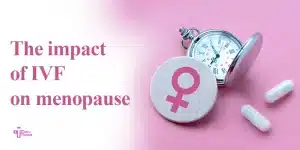
Treating infertility, having a successful pregnancy with the least trouble, and giving birth to a healthy baby can be challenging and stressful enough. Now, imagine an air trip happen in the meantime! But should the infertility treatment process make you postpone your travel for a long time? Can air travel, in particular, endanger the health of the mother and fetus, or even the newborn baby? In this article, we are going to cover some general questions in this regard in the hope that we will address some of your potential concerns. This article will cover the following topics:
- Are there any restrictions on air travel for pregnant women?
- How many days after embryo transfer after IVF or IUI, is it possible to travel by plane (or air travel)?
- How many days after the baby is born, is it possible to travel by plane?
So if these are your concerns, stay tuned. The fact is that traveling is one of the best ways to reduce stress, and since infertility treatment is a slightly time-consuming and complex process that can bring a lot of pressure to the involved people, it is clear that eliminating travel from life is not an appropriate option. You can still plan your trip with some arrangements, considerations, and preparation. However, on some special days of this period, it may be better not to travel and to be located in a stable place and we will discuss it in more detail later. More importantly, at every stage of the process, you should not forget to consult with your treatment team about any upcoming event or decision-making.
In this section, we will take a closer look at the issue.
Is air travel generally prohibited during pregnancy?
Extensive studies of pregnant women have confirmed that air travel during pregnancy will be generally safe and without any possible complications. However, pregnant women whose underlying medical conditions, including venous stasis and thrombosis (blood clots), may worsen with flight, or who may have heavy vaginal bleeding and miscarriage, are advised to prevent themselves from air travel during pregnancy. This, therefore, requires consultation with the treating physician and may vary from person to person.
IUI (Intrauterine Insemination): Travel before and after the procedure:
One month before IUI, there will normally be no problem traveling. However, it is best to contact your infertility treatment center to schedule important appointments and visits, such as sonography to monitor follicular growth. Oral medications for this process, such as Clomid, can be taken with you during the trip, just like any other medications. However, some injections to trigger ovulation, such as hCG, require special storage conditions, such as a certain temperature. In these cases, be sure to consult your infertility treatment clinic to be aware of them in advance.
IVF: Traveling Before the procedure:
According to specialist doctors, traveling within 10 to 12 days before IVF egg retrieval can be challenging. Because during this period, it is necessary for the mother to go to the infertility treatment center almost daily to perform the required ultrasounds, so that the doctor can determine the best time to start ovulation (triggering ovulation). However, since reputable fertility centers can be located in different places, if a necessary trip occurs, in consultation with a physician, the patient can be temporarily monitored by other fertility centers as long as it does not jeopardize the cycle.
IVF: Travel after egg retrieval:
According to doctors, one day after the egg retrieval stage, there will be no problem to travel. On the same day, however, it is better not to travel. Some clinics use anesthesia to perform this step, which can cause anesthesia symptoms 2-4 hours later, depending on the clinic’s treatment approach. During the stimulation cycle, the patient’s estrogen levels increase. This can cause mild symptoms such as bloating or abdominal discomfort. Therefore, sitting on a plane or car for a long time may feel uncomfortable. During this time, it is best to stay hydrated and take short walks and stands to reduce pain and discomfort that may be affected during the trip. It should be noted that even after the egg retrieval stage, the mother’s ovaries can remain enlarged for another 10 to 14 days. Enlarged ovaries can become “torsion” or rotated, which can lead to pain and in some cases require surgery. Therefore, carrying heavy equipment and sudden movements during the trip should be avoided.
IVF: Travel after the embryo transfer:
According to doctors, there will be no particular problem with traveling after the embryo transfer. The only thing to note is that it is necessary to go to the fertility clinic 10 to 12 days after the transfer of the fetus to perform a pregnancy test.
Is it possible to travel by air with a newborn baby?
Doctors generally recommend avoiding especially long distance air travel until the baby’s immune system is more developed. This period can last about a month. Premature babies or babies with heart or lung problems may also have difficulty breathing due to low air pressure in an airplane cabin.

Some other considerations:
- If you are going to get a special vaccine for your trip (for example, hepatitis A), consult your doctor before taking any action.
- Ask your doctor about the details of another treatment clinic in your destination that he or she recommends.
- Before reaching the destination, get the details of medical centers and pharmacies close to your place of residence.
- Make sure of the amount of medication needed during your trip in advance and provide them with the advice of your doctor.
- Also, some medications require special storage conditions, therefore, make sure you can meet them.
- If you need to inject certain medications during your air travel, be sure to bring a letter from your doctor with instructions for the treatment.
- Before traveling, make sure that your destination is not a particular disease outbreak site that is specifically dangerous for pregnant women.
We hope that the issues covered in this article have greatly alleviated your concerns and ambiguities. However, if you still have questions, do not forget that the consulting physicians of TebMedTourism Co. are ready to answer your questions, free of charge, 7/24.













